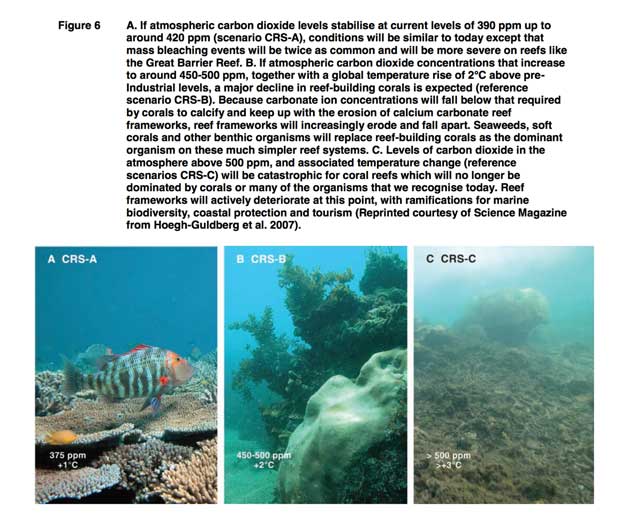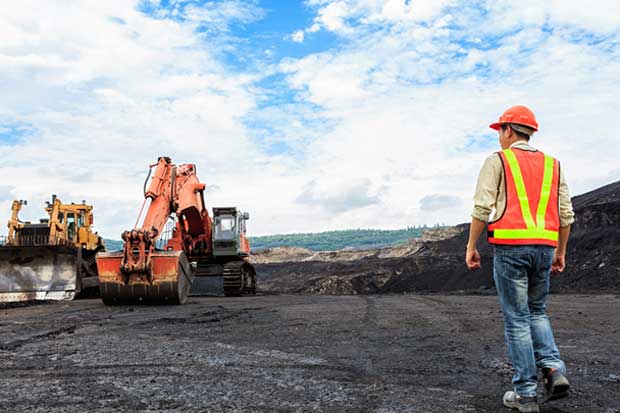Adani – an Indian company seeking approval to build one of the world’s largest coal mines in Queensland – has argued in court this week that the massive carbon emissions its Carmichael mine would generate are not its responsibility.
The company’s expert witness will testify that global temperatures are on track to rise by 3.1 degrees. That would destroy the Great Barrier Reef, but Adani says that there will be demand for the vast amounts of coal it is proposing to export, whether or not its mine goes ahead.
On Tuesday, the Queensland Land Court heard the arguments as part of a five-week probe – or ‘merits appeal’ – initiated by an Australian community group.
Land Services of Coast and Country, represented by the Queensland Environmental Defenders Office, objects to the Carmichael mine’s climate impacts, among a wide range others.
In evidence tendered to the court, Adani’s expert witness – Dr Chris Taylor – argues that the internationally agreed target of limiting global warming to two degrees is ‘highly unrealistic’.
He says that the actions of countries, at the time of writing, suggest a global warm of 3.1 degrees above pre-industrial levels by 2100 is much more likely.
But almost 200 countries have agreed to limit global temperature increases to below two degrees, and their post-2020 carbon emissions reductions commitments will be formalised in December this year at the Paris climate talks.
What is astounding about the argument Adani is making, though, is that it essentially assumes the Great Barrier Reef will be lost.
The right-hand panel on the image below, taken from an article in Science (the leading American scientific journal), “more or less” shows what that would mean for the reef, Professor Ove Hoegh-Guldberg told the court yesterday.

Professor Hoegh-Guldberg is Land Services’ expert witness. Along with around 20 other scientists, he authored the Science article in 2007.
In his evidence, Professor Hoegh-Guldberg also refers to a 2014 report from the government advisory body on the reef – the Great Barrier Reef Marine Park Authority – which notes that “to ensure the reef remains a coral dominated system later science indicates global average temperature rise would have to be limited to 1.2 degrees Celsius”.
The dire impacts climate change is set to have on the reef aren’t the real contention, though. Rather, it’s who’s ultimately responsible for them.
“In court there was an attempt by Adani to say that the impacts of burning coal overseas are sort of indirect,” said the Chief Executive Office of the Queensland EDO, Jo-Anne Bragg.
“The Adani case,” Bragg explained, “says if we didn’t dig the coal up and sell it to these coal fired power stations overseas, someone else would.”
Council for Adani illustrated the point with an analogy, arguing that if someone drove a car they would be responsible for the emissions, not the person who sold the petrol.
Professor Hoegh-Guldberg responded with an analogy of his own: “I think if you then take cigarette manufacturers, they don’t grow the tobacco, but they package it up nicely, and clearly they’re being regulated,” he said.
A spokesperson for Adani said the company would not comment on the legal proceedings specifically, but argued that the project’s impact on the Great Barrier Reef was justifiable because of the economic benefits it would bring.
“Adani's mine, rail and port projects in Queensland, which will deliver 10,000 jobs, $22 billion in taxes and royalties for the state, and vital opportunities for small and medium sized businesses, will deliver nation-building infrastructure in Australia while helping deliver energy security in India,” the spokesperson said.
“One way or the other, coal is going to be a large part of India’s energy future, and it’s better to use higher quality coal from stringently regulated nations like Australia, rather than elsewhere,” he said.
New Matilda understands that in coming weeks, the accuracy of these economic justifications will also be tested in court, but the EDO does not agree, even if there would be demand regardless of where the coal comes from, that justifies the project.
“Under the Queensland Environmental Protection Act, the damage caused by burning the coal overseas is relevant to the decision under Queensland law,” Bragg said.
The Environmental Defenders Office will argue that, when approving the project, the Queensland government knows it will be burnt, and therefore the impact it will have on the reef and other ecosystems.
“Therefore [it’s relevant to] whether or not to issue the environmental authority in Queensland, and under what conditions,” Bragg said.

This debate about who is responsible for future emissions is taking place against the backdrop of an already badly damaged reef.
Last year, the United Nations moved to hold Australia responsible for its failure to protect the reef, threatening to list the World Heritage site as ‘in danger’.
A range of factors have contributed to its decline, but climate change is acknowledged as the greatest threat to the reef, because it leads to coral bleaching, ocean acidification, extreme weather events and rising sea levels.
Over the last 40 years it has lost more than half of its coral cover, and last year the federal government concluded its condition is poor and deteriorating.
Yesterday, a report by three of the nation’s top reef scientists concluded that “so far, global warming has triggered two major bouts of coral bleaching on the Great Barrier Reef, in 1998 and 2002”.
The report identified a range of ‘stressors’ affecting the reef – one of which was climate change – and slammed the government for not doing enough to protect the natural wonder.
It recommended against the development of the Galilee coal fields, which includes Adani’s Carmichael mine, and collectively would create more carbon emissions than nations like the UK, Italy and South Africa.
It also recommended against approval of Adani’s associated proposal to build the world’s largest coal terminal at Abbott Point, near Mackay.
The report criticises the government’s recent “short-sighted” Reef 2050 plan, which was designed to address UN fears.
“Critically, the revised plan lacks any action on climate change,” it said.
“The future of the Great Barrier Reef depends on the Australian and Queensland governments taking their responsibilities more seriously than recent decisions such as the relaxation of tree-clearing laws in Queensland, the weakening of renewable energy targets, subsidising the extraction of fossil fuels and scrapping a price on carbon emissions,” the report said.
Adani’s spokesperson, however, argued the “latest supercritical generators in India” are less environmentally damaging than Australian coal-fired power plants.
“This is certainly better for the environment and human health than the current reliance of hundreds of millions of [predominately Indian]households on methane-intensive traditional energy sources such as cow dung, crop vegetation and firewood, ordinarily burned on poorly ventilated stoves,” the spokesperson for Adani said.
Donate To New Matilda
New Matilda is a small, independent media outlet. We survive through reader contributions, and never losing a lawsuit. If you got something from this article, giving something back helps us to continue speaking truth to power. Every little bit counts.



